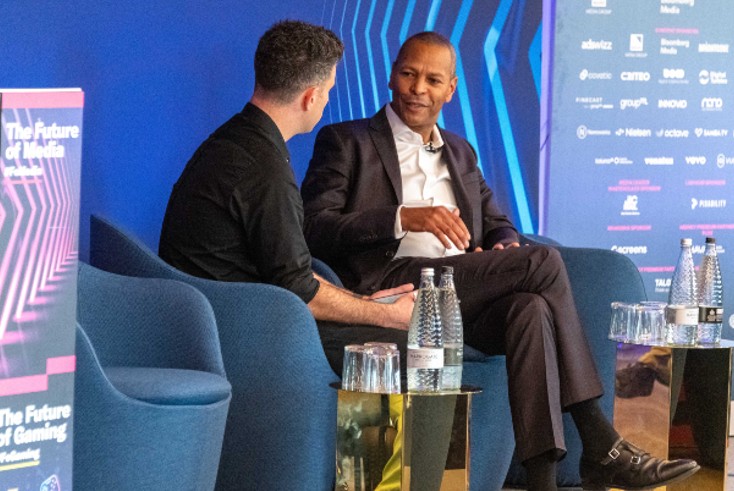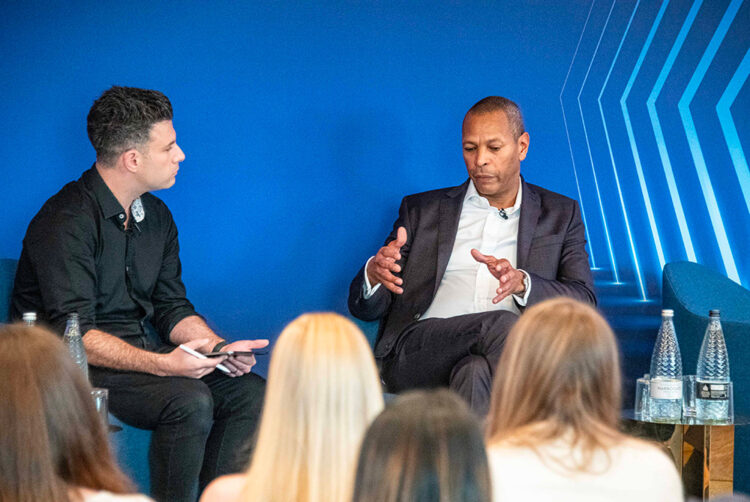The Sun publisher Dominic Carter warns of 'nefarious' MFA and insists news remains core to US push

The Future of Media
The Sun‘s EVP and publisher Dominic Carter discussed the outlet’s business and editorial strategy in the US market, and explained how the tabloid newsbrand has phased out links to ‘nefarious’ made-for-advertising platforms.
It has been more than three years since The Sun first launched in the US. In that time, the outlet has prioritised adaptability as it tests and learns within the market, and according to The Sun‘s executive vice-president and publisher Dominic Carter, the venture has thus far been a big success.
Speaking with The Media Leader editor-in-chief Omar Oakes at The Future of Media event in London this week (11 October), Carter said the US outlet has seen “pretty incredible growth” since launch, thanks in part to the “huge ad market” that exists in the country. Carter did not give figures but parent company News Group Newspapers reported in April that US audiences had grown 193% in 2022 compared to the previous year.
Whereas The Sun‘s brand in the UK is well-established after its 59 years of publication in the country, the name recognition in the US is predictably less common. When Oakes asked how the brand is being translated for US audiences, Carter said that investment in US journalists, many of whom are young, female, and attuned to the content their target audiences most want to consume, has helped establish the outlet’s branding.
“It’s all about understanding what the consumer wants, and giving them more of what they want,” he said, adding that while The US Sun is based in New York City, it also operates “on the West Coast and through the middle of America” to speak to “the whole of the US with the right sort of content.”
The US Sun has predominantly focussed its coverage on lifestyle and celebrity news as it targets especially female American audiences. Such a strategy is not just good for audience building, but for business more broadly. As Carter noted, “You’ll make your money on lifestyle and celebrity more than on news.”
Still, Carter stressed that “news is at the core of what we do” and that the majority of their investment goes into news journalism. “The Sun has always been an entertainment channel that satisfied the needs from the hard (the news) to the soft (the lifestyle),” he said.
He offered that hard news is an excellent opportunity for brands if they can identify the “right opportunities” for positive brand association next to news. He criticised advertisers for being overly cautious with their keyword blocking, despite understanding brands’ risk aversion. “I always say that advertisers should think about their keyword blocking […] I don’t think that’s done enough.”
Carter admitted that, unlike The Sun in the UK, the outlet has thus far actively chosen not to take a position on US politics. That has allowed the outlet to create more advertiser-friendly “non-controversial” output in its infancy as it builds its audience.
However, when prodded by Oakes whether the outlet will weigh in on the US presidential election next year, Carter said they will “take a view”.
British Invasion: how The Sun’s US launch required adaptability
‘Conscious and mindful’ in building out its gambling interests
Oakes asked Carter about the degree to which the increasing legalisation of gambling advertising in the US “moved the dial” on pushing The Sun into the US market.
In the UK, The Sun has a long history of supporting gambling advertising, and it is a core part of its ad business; the paper runs a betting section which it fills with gambling site promotions and previous ran a full gambling vertical, Sunbets. But Carter rejected the implication that the gambling opportunity was core to The Sun‘s expansion into the US market.
“No. It was the brand first and its content,” he insisted, adding that The US Sun has only begun moving into gambling in the past twelve months.
“We’ve been very conscious, mindful and defensive over how we’re going to build our [gambling] business in the US,” Carter continued, further stating that the publisher’s experience and expertise in the UK market should give it an edge over other publishers exploring the space.
Content recommendation platforms are ‘nefarious’
The Sun has taken steps in recent months to stop working with the likes of Taboola and Outbrain, which provide article and advertising recommendations on news sites. Instead, the publisher has swapped out such material with its own internal content recommendation platform. Carter said that The Sun did so because it became convinced, given its close understanding of its audience, that they could double revenues compared to those content recommendation companies. And, he said, they have.

He criticised such platforms for harming publishers’ user experiences by inundating sites with too many advertisements, going so far as to call them “nefarious” in offering poor quality content.
“[In-housing content recommendations] is a better user experience than sending them out of your site to some nefarious site with a clickbait headline, which is effectively what a lot of those content recommendation companies do,” Carter stated.
Carter admitted he was concerned such platforms were overpopulating The Sun with digital advertising. “We’ve taken more out of our site in the last few years than put stuff in. And actually it has a really positive impact in terms of the value of the advertising that you have got on the site.”
He added, however, that not every publisher will have the capacity to invest in their own content recommendation platform, and that “the lure of a guaranteed revenue” may be irresistible for many publishers.
‘Harder to break the market now than it was when we did it’
When Oakes prompted Carter to reflect on the challenges of launching a British newsbrand in the US market, Carter advised others exercise caution and patience.
“Because it looks like a pot of gold, people assume they can just go and publish and make money,” he said. “The reality is, you’ve got to build it slower than you may have imagined. […] You have to be prepared to invest and test. It isn’t simple. It is competitive in the same way it’s competitive here. And you have to keep your unique tone of voice. Don’t try to be something different. Be the thing that you are. That will yield its dividends.”
A number of UK publishers have entered in the US market over the past decade, including The Guardian and The Independent. More recently, Reach titles like the Express and Mirror have also launched, and fellow News UK title The Times has recently hired a new US editor as the title looks poised to expand its US footprint.
But Carter warned he believes it was “easier for us, having done it three years ago, than it is for someone today.”
“The market is slightly different. Google has changed a lot of its algorithms, social is not the same as it was at that point. So it’s harder to break that market now than it was when we did it.”




